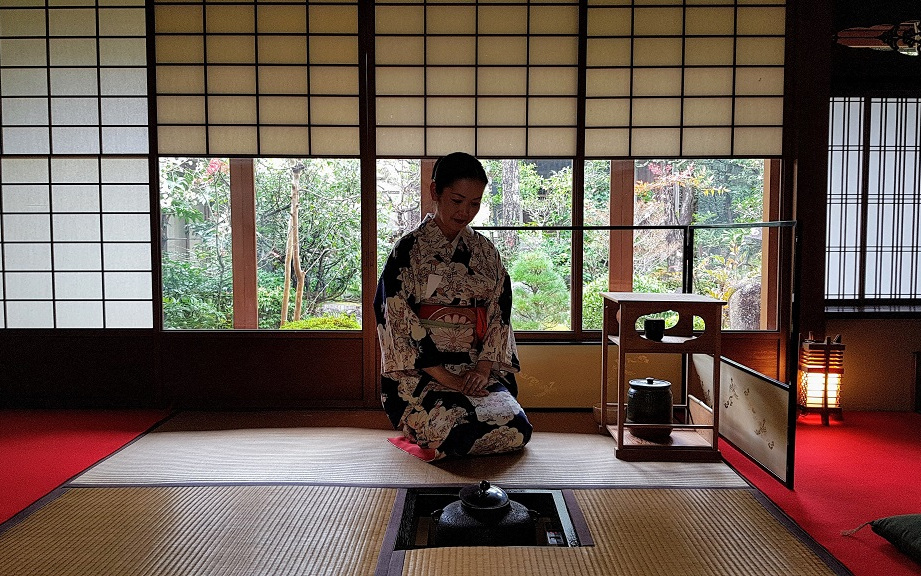In today’s always-connected, endlessly busy world, finding moments of true tranquility sometimes feels like an unattainable dream.
Yet in Japan, a country with a reputation for being fast-paced, centuries-old temples continue to offer sanctuary through the practice of Zen meditation.
So, join me as we explore five exceptional Zen meditation experiences. Each one opening a door to this profound tradition, allowing you to immerse yourself in its healing power.
Take my Zen Meditation Experiences Quiz
Answer just a few quick questions and I’ll give you my recommendation for the best Zen meditation experience for you.
- Take my Zen Meditation Experiences Quiz
- VIDEO: Shingon Buddhist Meditation – Morning Prayers at Henjosonin Temple, Koyasan
- Where can I experience authentic Zen meditation in Japan?
- 1. Private Kyoto Temple Visit With Zazen, Sutra Copying, & Matcha
- 2. Zazen: Shakuhachi Flute & Tea Ceremony in Hakone
- 3. Zen Teachings: Guided Zazen & Sutra Meditation in Tokyo
- 4. Seigan-ji: Rock Garden Meditation & Coffee in Shiga
- 5. Dawn Zazen at Taizo-in: Private Tour & Tea in Kyoto
- Finding Peace: Zen Meditation FAQ
- 1. What is Zen meditation?
- 2. What can I expect during a typical Zen meditation session?
- 3. Are these Zen meditation experiences suitable for beginners?
- 4. What is sutra copying and why is it included in some Zen meditation experiences?
- 5. What is the significance of the tea ceremony in Zen meditation?
- 6. What is the benefit of incorporating the Shakuhachi flute into Zen meditation?
- 7. How can I choose the best Zen meditation experience for me?
- Your Zen meditation encounter awaits
- Recommended for you
- RESOURCES
- Take my Zen Meditation Experiences Quiz
- Leave A Comment / Ask A Question
- About the Author
- I'm Rob, and I've been where you are
- Benefits You Can Choose
- What Clients Say
- How It Works
- Ways I Can Help You With Concierge
- Ready to Get Started?
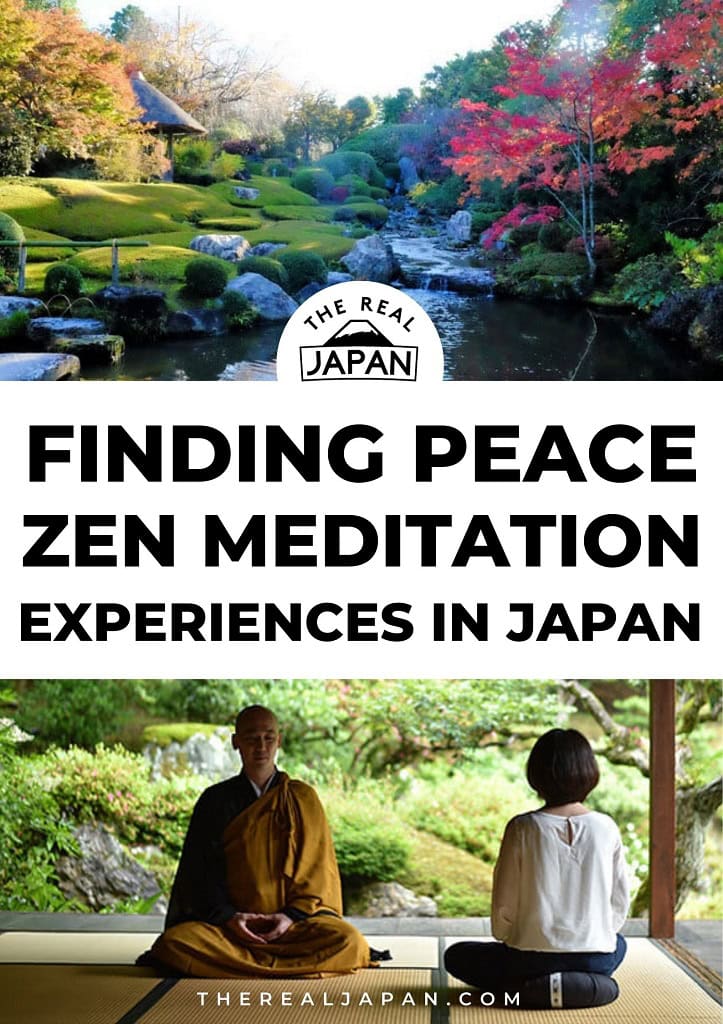
Find Peace With These 5 Extraordinary Zen Meditation Experiences
by Rob Dyer
In our increasingly chaotic world, perhaps there’s no better time to step through these temple gates and discover the timeless wisdom of Zen meditation.
My first experience of Zen meditation was when staying at a shukubo (Buddhist temple) in Koyasan in Wakayama Prefecture, I participated in meditation and morning prayers (see the video below). I’m not a religious person, but it was a very calming experience.
Why not make your next trip to Japan more than just a vacation, but a journey toward inner peace? Pull back the curtain on The Real Japan with these exclusive expert-led experiences.
VIDEO: Shingon Buddhist Meditation – Morning Prayers at Henjosonin Temple, Koyasan
Where can I experience authentic Zen meditation in Japan?
It’s possible to take part in Zen meditation in many parts of Japan. In this guide I focus on five extraordinary Zen meditation experiences at various temples and locations across Japan:
Dawn Zazen at Taizo-in: Private Tour & Tea in Kyoto: This private experience within the Myoshin-ji temple complex is led by Deputy Head Priest Daiko Matsuyama, a global ambassador of Zen. It includes a temple tour, an explanation of the famous ink wash painting “Catching a catfish with a gourd” and zazen on the abbot’s veranda.
Private Kyoto Temple Visit With Zazen, Sutra Copying, & Matcha at Kosei-ji Temple: Led by the deputy head priest, this experience includes a meditation session in front of a stunning rock garden, sutra copying, and a traditional tea ceremony.
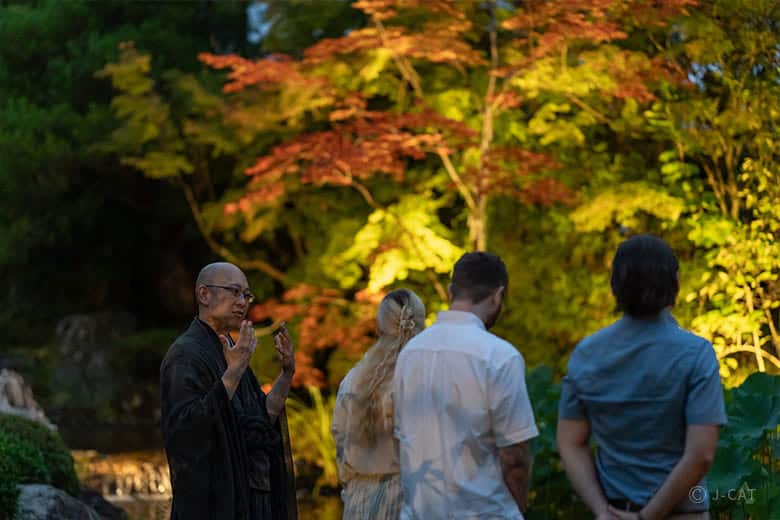
Zazen: Shakuhachi Flute & Tea Ceremony in Hakone at Tokoan: This unique experience incorporates the haunting melodies of the Shakuhachi flute played by master Lenzan Kudo into the meditation practice, followed by a tea ceremony.
Zen Teachings: Guided Zazen & Sutra Meditation in Tokyo at Mishōan: Located in Shiba Park, this morning experience includes a sermon by Zenchi Uno, zazen meditation, sutra copying, and a tea ritual.
Seigan-ji: Rock Garden Meditation & Coffee in Shiga: This Shiga Prefecture temple offers zazen in a garden-viewing room overlooking a unique rock garden that transforms during rainfall. The experience concludes with siphon coffee prepared by the head priest in a rare teahouse.
1. Private Kyoto Temple Visit With Zazen, Sutra Copying, & Matcha
Whispers of wisdom and stillness with a deputy head priest
If you’re seeking to delve into the contemplative world of Zen meditation, an extraordinary opportunity awaits at Kyoto‘s historic Kosei-ji Temple. Hidden along the atmospheric Demizu-dori Street, this once-private temple – a prestigious monzeki (Buddhist temple) that historically hosted head priests of imperial lineage – has recently opened its doors to visitors seeking authentic spiritual experiences.
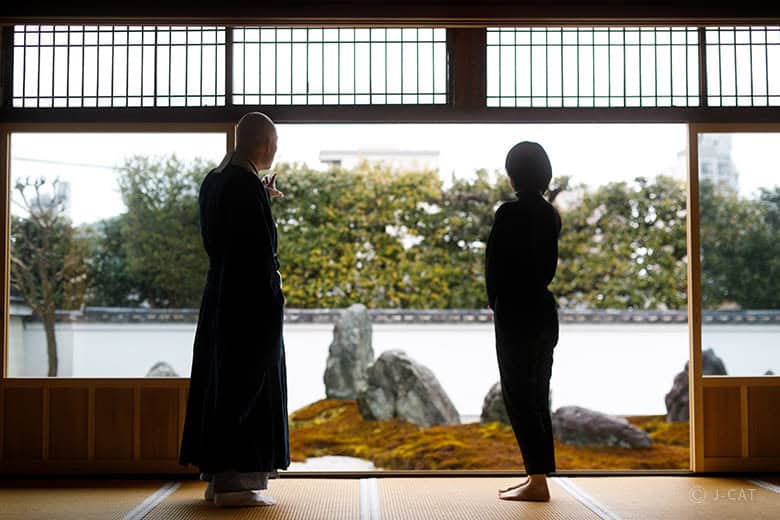
Under the thoughtful guidance of the deputy head priest himself, guests are invited to explore the temple’s heritage before embarking on their meditation journey. The experience unfolds in front of the magnificent Shinwa-no-Niwa, a huge rock garden spanning 330 square meters. Designed by the renowned landscape architect Mirei Shigemori, the garden’s four “islands” cleverly form the character for “heart,” while carefully positioned rocks reflect the auspicious numbers three, five, and seven.
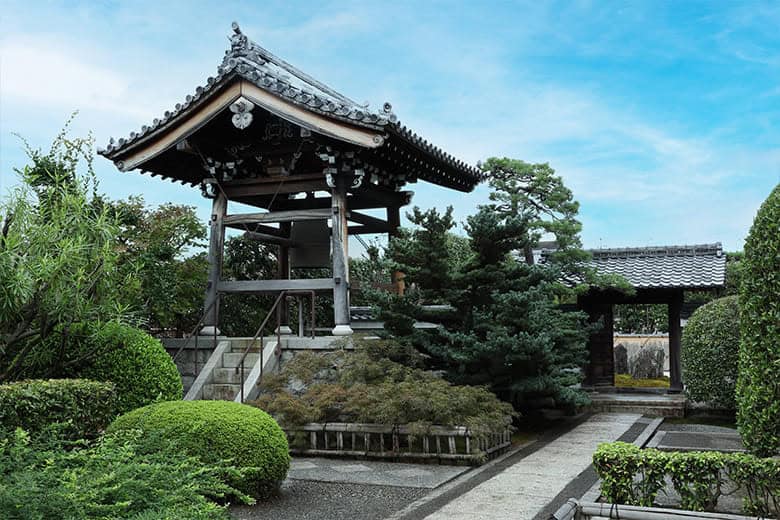
The meditation session begins with gentle instruction on proper posture and breathing techniques, making it accessible even for complete beginners. Anyone who finds traditional sitting positions challenging can opt for chair-based meditation. As the deputy head priest explains, the goal isn’t to achieve a state of nothingness, but rather to observe one’s emotions objectively. The 30-minute session provides just enough time to settle into the practice while remaining approachable for newcomers.
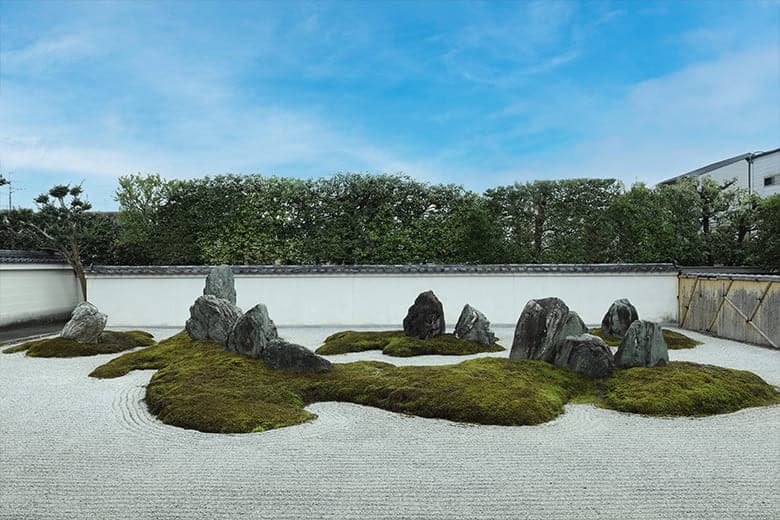
Following the meditation, you’ll engage in the mindful practice of sutra copying, carefully tracing the characters of the Kannon Bodhisattva sutra while overlooking the serene rock garden.
The experience concludes with a traditional tea ceremony, where seasonal wagashi sweets from local establishments like Shioyoshiken and Tokiya complement perfectly prepared matcha. This moment of reflection offers a chance to discuss the experience with the deputy head priest and consider how to incorporate these moments of mindfulness into daily life.
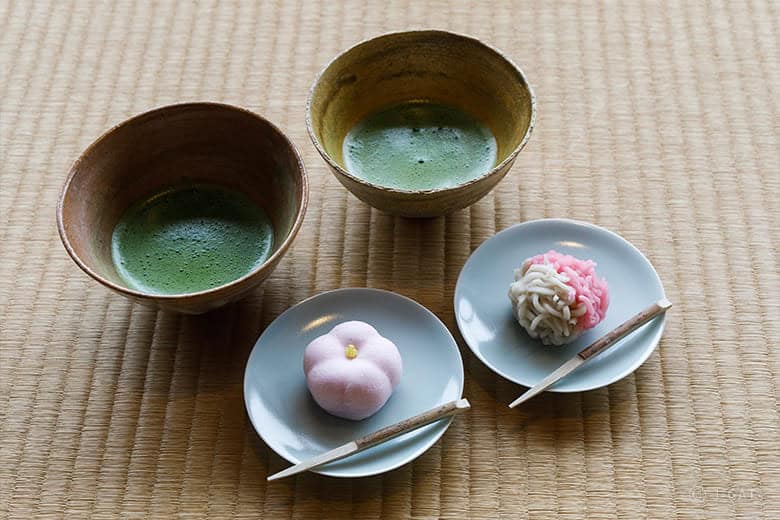
What makes this experience particularly special is its authenticity – this isn’t a tourist-centered simulation but rather a genuine opportunity to participate in centuries-old practices within a living, breathing temple. The deputy head priest’s warm approach ensures that even those new to Zen practices feel welcomed and supported throughout their journey into this contemplative world.
LEARN MORE: Private Kyoto Temple Visit With Zazen, Sutra Copying, & Matcha
2. Zazen: Shakuhachi Flute & Tea Ceremony in Hakone
The flute’s song at a historic retreat inside Kumano Gongen Shrine
Hidden away in the misty mountains of Hakone lies Tokoan, a historic retreat where the haunting notes of the shakuhachi bamboo flute guide practitioners deeper into meditation. Here, master player Lenzan Kudo bridges ancient tradition with contemporary sensibility, having performed everywhere from BBC studios to collaborations with renowned composer Ryuichi Sakamoto.
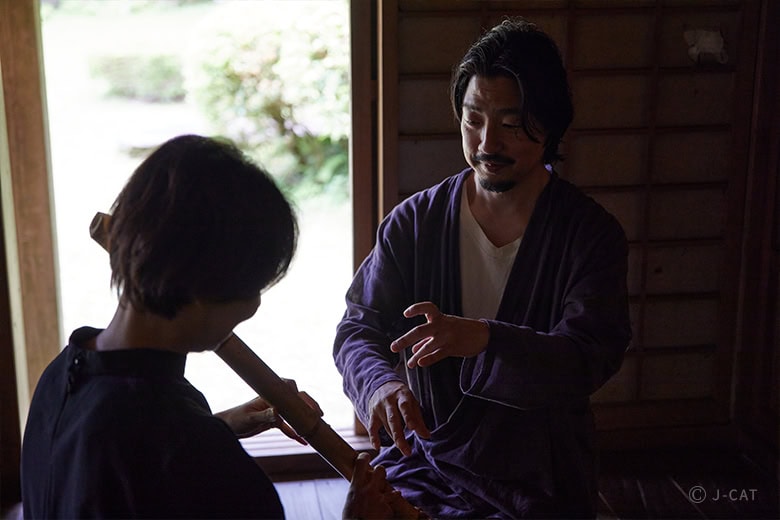
The setting itself is steeped in history – Tokoan sits within the grounds of Kumano Gongen Shrine, where literary figures of the Edo period would gather for poetry exchanges and tea ceremonies between visits to the local hot springs. Though the original structure was demolished in 1882, its 2001 restoration as a designated historic site perfectly preserves its contemplative atmosphere.
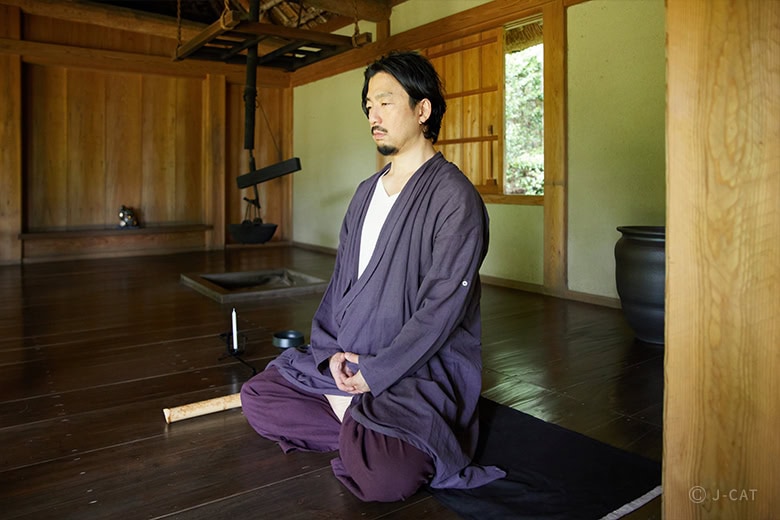
The shakuhachi used in this experience is a jinashi-shakuhachi, featuring an elegantly simple design with just five holes. Lenzan explains how this instrument’s sound reflects the player’s mental and physical state, making it an ideal tool for meditation. For those interested, there’s an option to receive guidance on playing the shakuhachi yourself, learning the fundamental techniques of breathing and positioning.
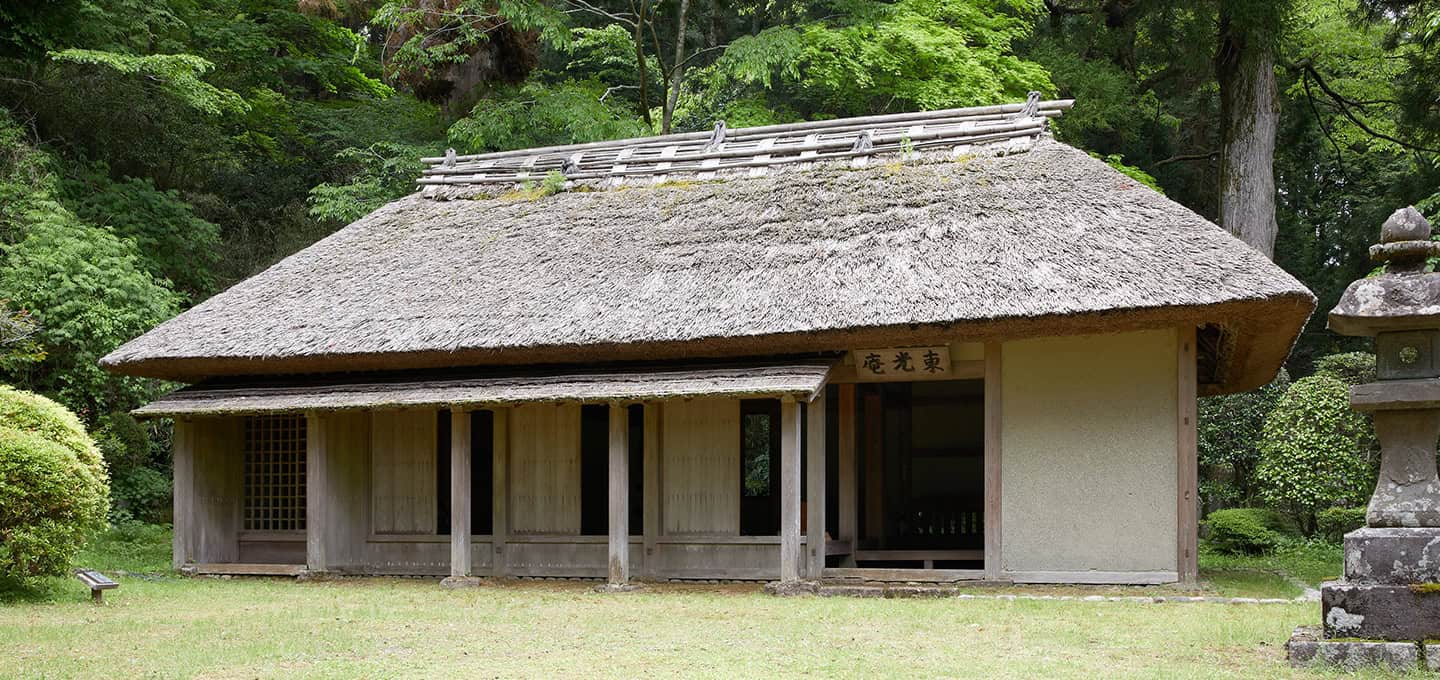
The experience begins with traditional zazen, but it’s what follows that sets this practice apart – suizen, or meditation through the shakuhachi flute. In this electricity-free sanctuary, surrounded by the sounds of nature, English-speaker Lenzan demonstrates how a single breath through the instrument can transform from silence to discord to harmony before melting back into silence – a perfect metaphor for life itself.
After meditation, over tea and wagashi sweets, Lenzan shares his journey from finding an old shakuhachi in his childhood home to performing across Europe. His suggestion to visit the nearby 300-year-old hot springs afterward proves to be the perfect ending to this transcendent experience.
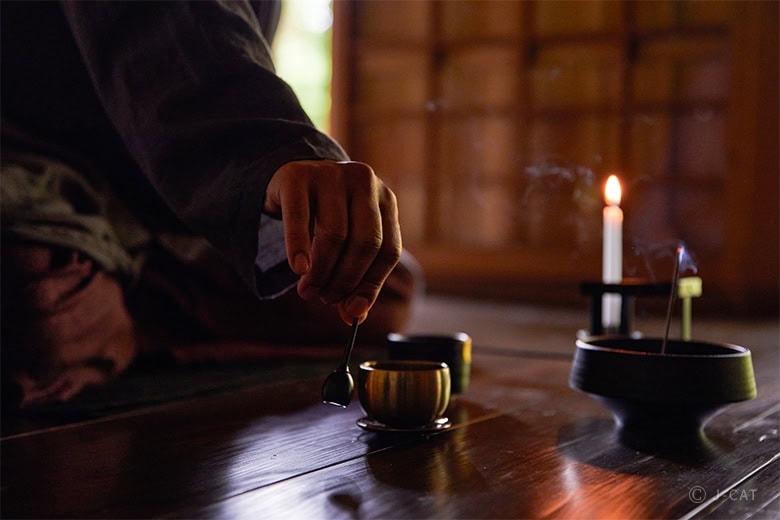
Each season brings its own character to the experience – from the chirping cicadas of summer to the crisp silence of winter, when temperatures can drop to negative 5 degrees Celsius. Yet even in the coldest months, practitioners still come to welcome the New Year with renewed minds, finding that the extreme conditions only enhance their meditation practice.
LEARN MORE: Zazen Meditation Guided Shakuhachi Flute at a Historic Hakone Site, with Tea and Wagashi
3. Zen Teachings: Guided Zazen & Sutra Meditation in Tokyo
Morning rituals at Mishōan in the heart of Shiba Park
In the heart of Tokyo’s Shiba Park, before the city fully awakens, the Mishōan training hall offers a remarkable opportunity to start your day as a Zen monk would. Available in English, under the guidance of Zenchi Uno, whose warm smile instantly puts visitors at ease, this experience combines meditation with the mindful practice of sutra copying.
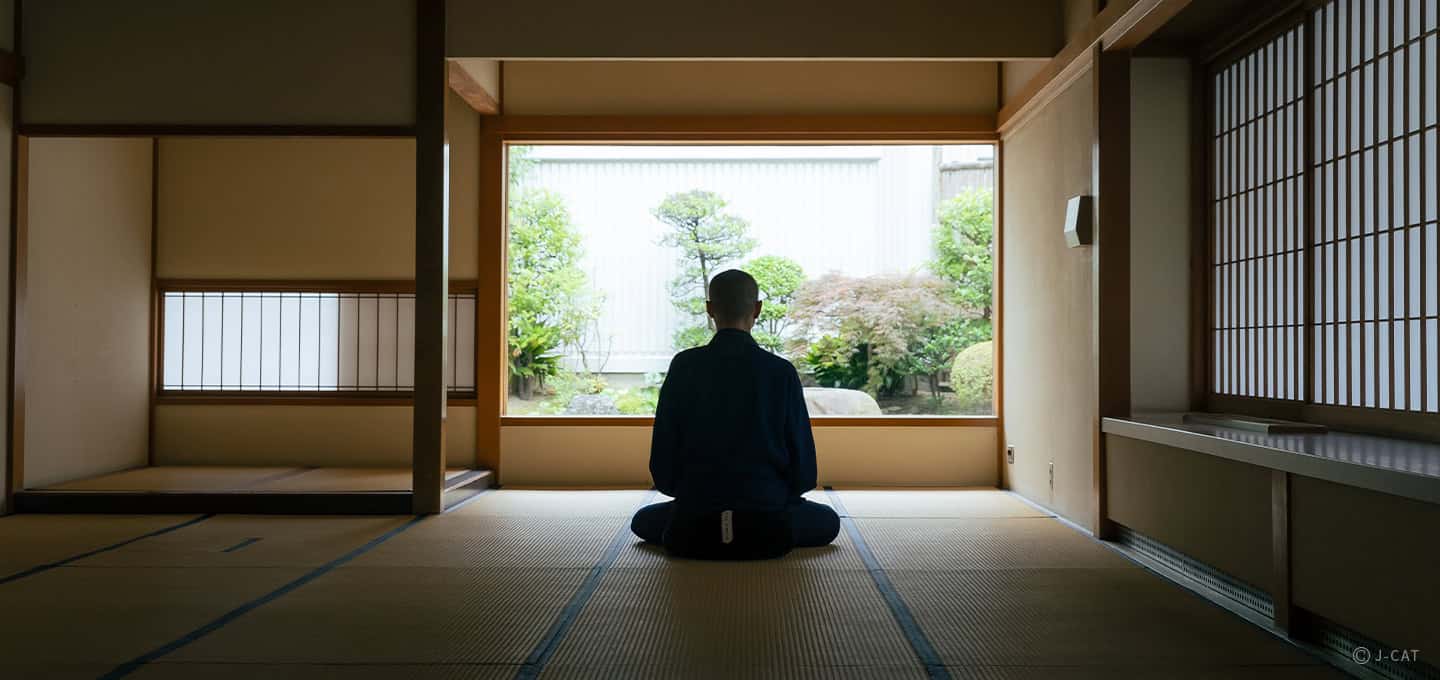
The morning begins with Uno’s sermon, which varies daily and might touch on anything from seasonal observations to practical applications of Zen philosophy in modern life. These talks have a way of opening your eyes to the richness of the world around you, helping you see familiar surroundings with renewed awareness.

As an executive researcher at the Soto Institute for Buddhist Studies, Uno brings scholarly depth to his teachings while maintaining an approachable style. His guidance during zazen meditation is particularly helpful for beginners – he often suggests imagining yourself in an open-air bath to achieve the right level of relaxation, making the practice less intimidating and more intuitive.
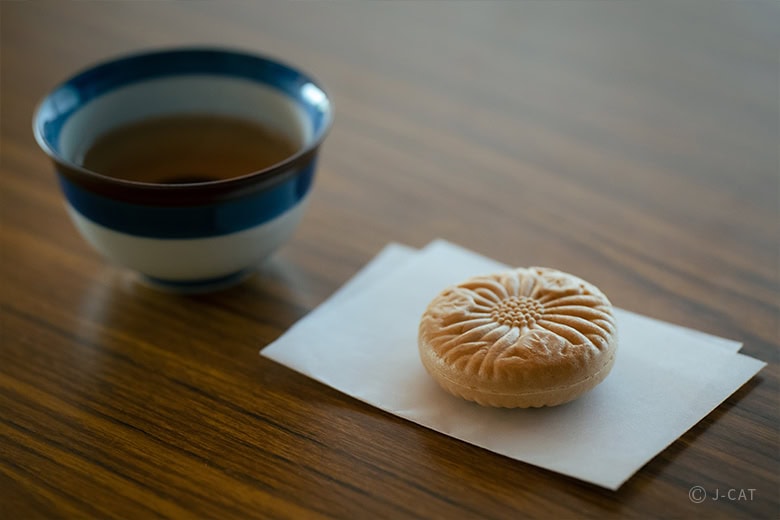
What makes this session special is how Uno personally selects sutras for each participant, considering their individual journey. The act of carefully copying these ancient texts becomes a form of meditation itself, leaving you with both a sense of accomplishment and a meaningful souvenir to take home.
The experience concludes with the gyocha tea ritual, where you learn the proper etiquette of drinking hojicha (roasted green tea) in a training hall setting. Uno’s explanation of how these seemingly formal rules actually serve to deepen mindfulness transforms every sip into an opportunity for presence.
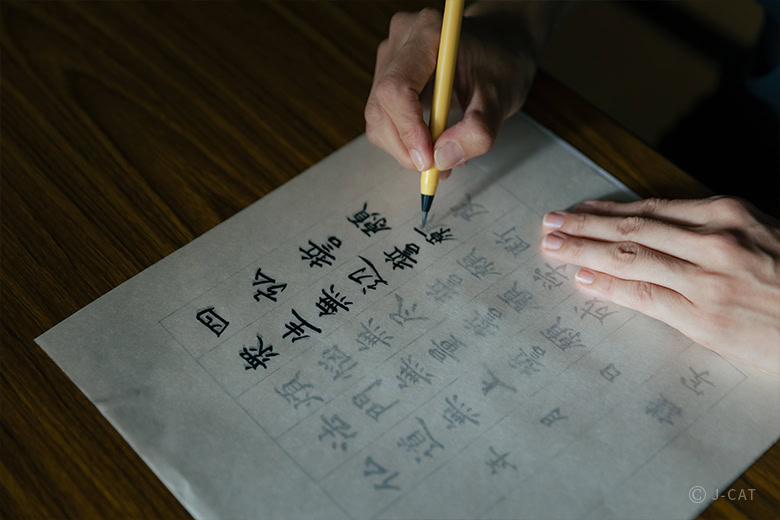
The experience includes a unique opportunity to handle and play traditional Buddhist musical instruments, usually reserved only for monks to touch during ceremonies. This hands-on element adds another dimension to understanding Zen practice, as Uno explains how these sacred sounds have been used for centuries to deepen meditation and mark significant moments in temple life.
LEARN MORE: Zen Worldview Ascetic Practices: Zazen & Sutra copying Meditation under Monk’s Guidance
4. Seigan-ji: Rock Garden Meditation & Coffee in Shiga
Unique rock garden meditation with a temple head priest
Just seven minutes from Maibara station, in Honshu’s Shiga Prefecture, sits a temple housing one of Japan’s most unique gardens. Seiganji’s rock garden performs a magical transformation during heavy rains, as its symbolic pond becomes literal – moss-covered grounds filling with water to create an otherworldly atmosphere.

The garden itself tells a fascinating story – designed in 1678 by the same master who created Hikone Castle’s famous garden, it uniquely functions as both a “wet” and “dry” landscape garden. The arrangement of rocks and moss is meant to represent Mount Potalaka, the mythical dwelling place of the Bodhisattva Kannon, and changes dramatically with the seasons.
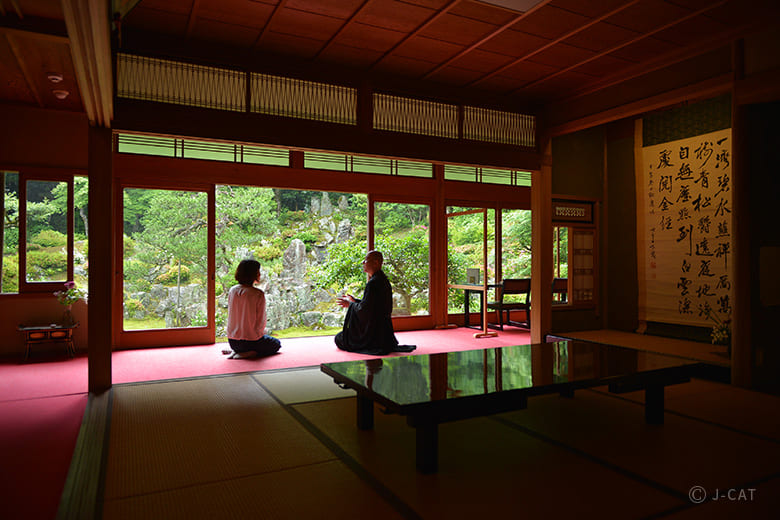
Inside the main hall, you’ll encounter a remarkable 1375 statue of Bodhisattva Kannon that survived the fires of war. Local tradition holds that the statue’s expression changes to match the mood of those who pray before it, creating a deeply personal connection with visitors. The hall also houses historical calligraphy by Meikaku Kusakabe, one of the “Three Brushes of the Meiji Period.”
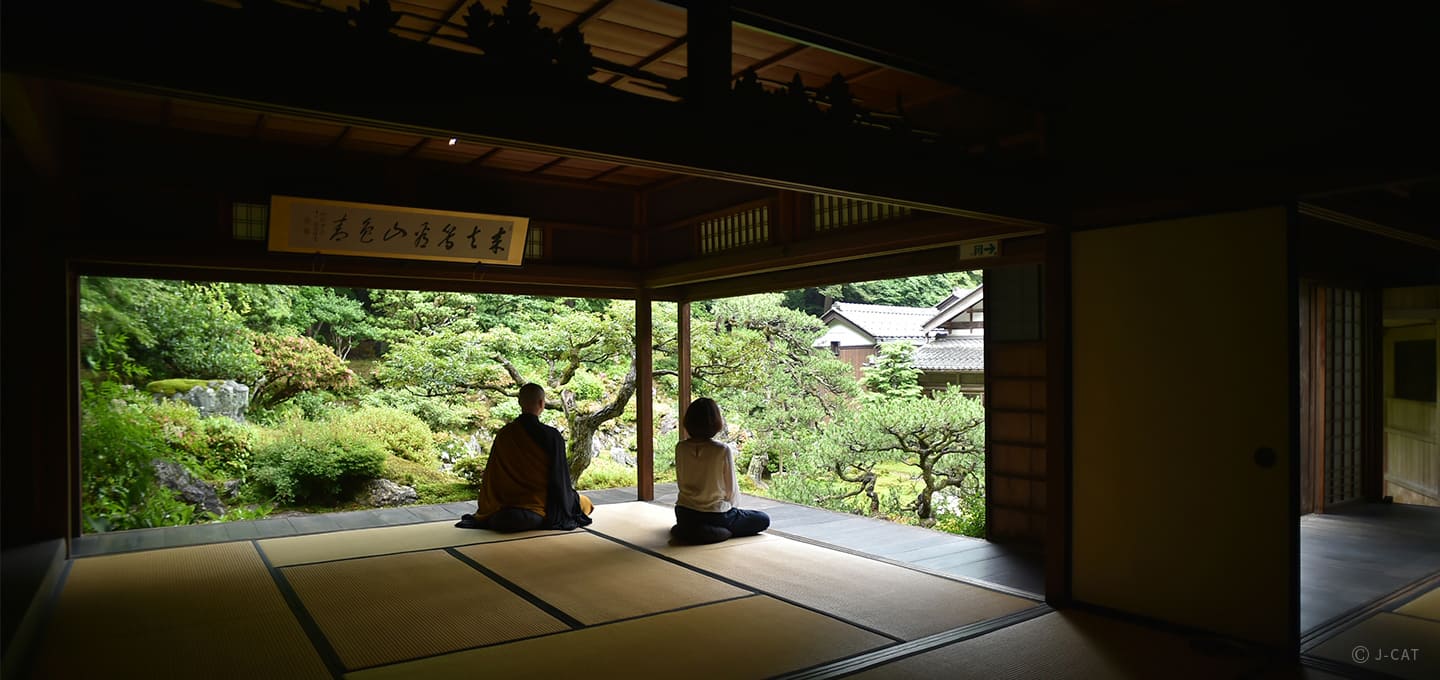
The exclusive opportunity to practice zazen in the garden-viewing room, rather than the main hall, makes this experience particularly special. The head priest’s flexible approach allows participants to find their own comfortable position, whether that’s traditional floor sitting or using a chair, always keeping the focus on inner peace rather than outer form.
The experience concludes at the temple’s rare teahouse, “Kissako,” where the head priest personally brews siphon coffee while you gaze out at the garden. The gift of handmade cookies, featuring a smiling Jizo motif, serves as a sweet reminder of your journey to inner peace.
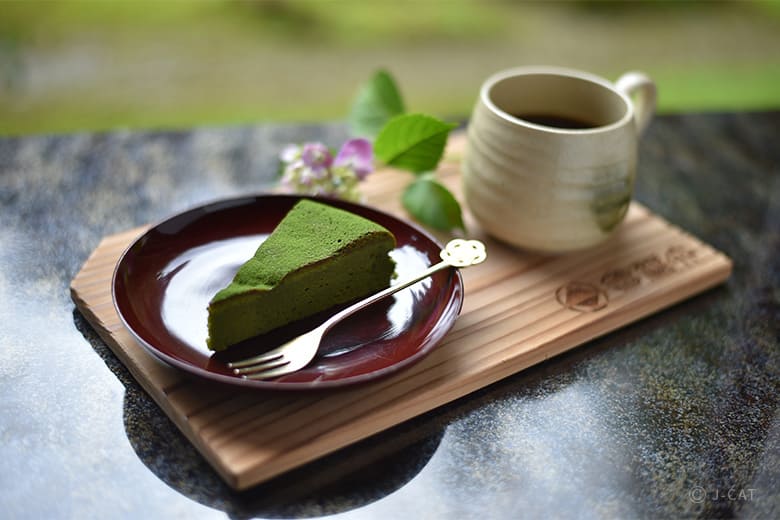
The teahouse menu offers an extensive selection of beverages, from traditional matcha to contemporary matcha lattes and carefully crafted syphon coffee. Seasonal desserts range from matcha gateau chocolate to traditional puddings, all designed to complement the tranquil garden view and extend the meditative experience into a moment of mindful indulgence.
LEARN MORE: Rock Garden Zazen Meditation and Coffee Time at Shiga’s Seigan-ji
5. Dawn Zazen at Taizo-in: Private Tour & Tea in Kyoto
Private dawn with a global ambassador priest with wagashi
Within Kyoto’s Myoshin-ji, Japan’s largest Zen temple complex, lies Taizo-in – a sub-temple offering an extraordinary private experience guided by Deputy Head Priest Daiko Matsuyama, a global ambassador of Zen who has met with a former Pope and attended the World Economic Forum.
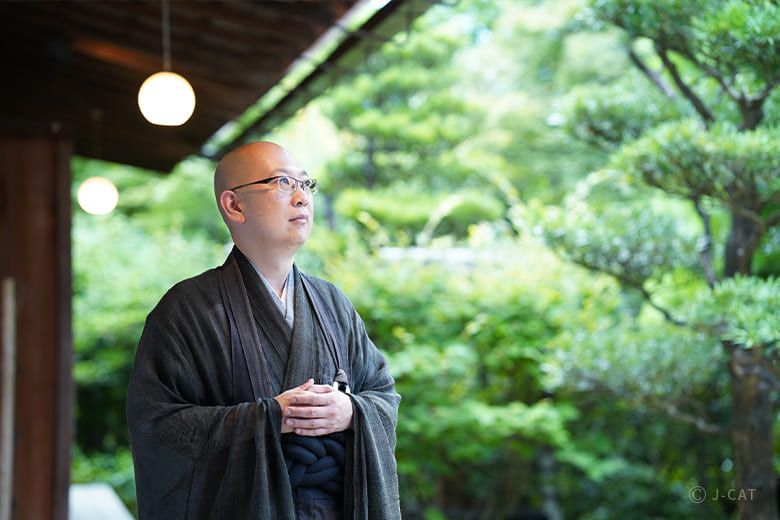
The temple complex itself is a marvel, spanning 31 mountainous hectares and encompassing 46 sub-temples. Taizo-in’s gardens offer three distinct experiences: the traditional “Motonobu no Niwa” dry garden, focused on perennial beauty; a newer dry garden from 1965 that has become famous in its own right; and the “Yoko-en” water garden, where seasonal changes create an ever-evolving display of natural beauty.
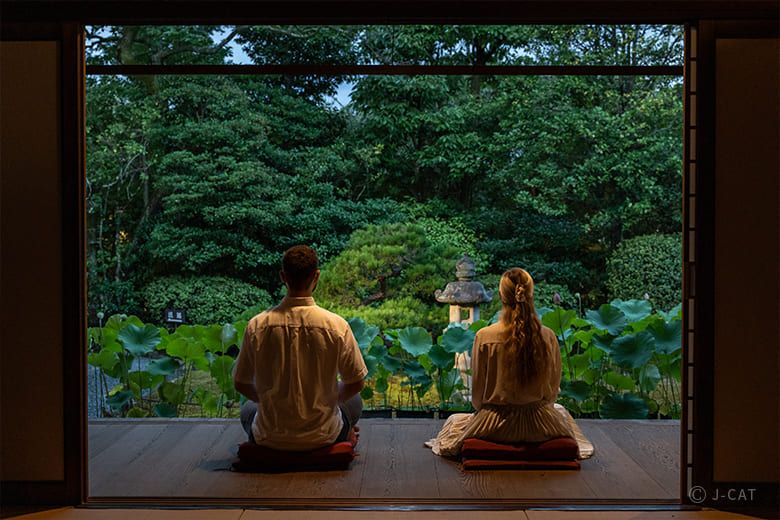
Matsuyama’s global perspective brings a unique dimension to the experience. As he explains, Kyoto tourism has evolved over three decades from merely seeing to doing, reflecting a worldwide hunger for authentic spiritual experiences. His ability to bridge Eastern and Western perspectives makes complex Zen concepts accessible to visitors from all backgrounds
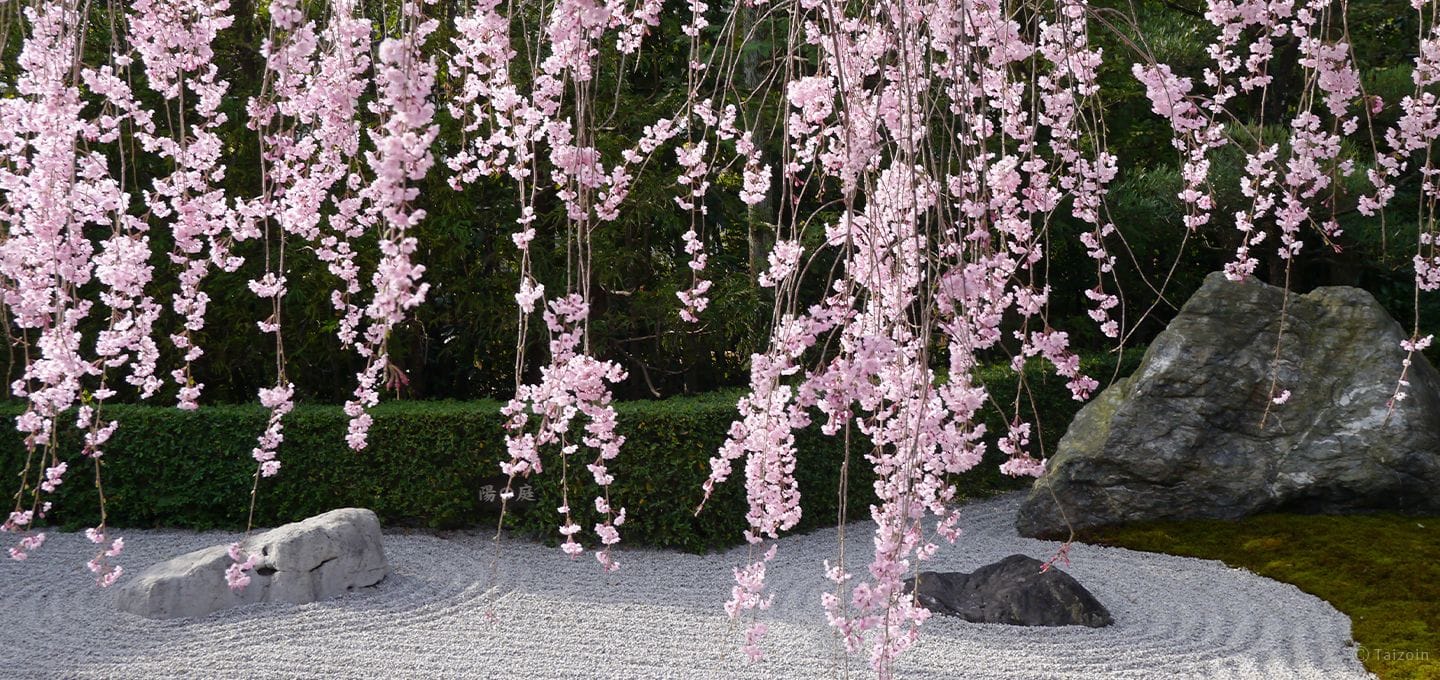
Before the temple opens to the public, Matsuyama shares insights into the temple’s national treasure, an ink wash painting called “Catching a catfish with a gourd“, whose hidden meanings offer deep insights into the nature of enlightenment. The exclusive tour, available in English, continues through three distinct gardens, each offering its own lesson in Japanese aesthetics.
The culmination comes with zazen practice on the abbot’s quarters veranda, where Matsuyama guides you to rediscover reality through your senses rather than through the filters of our information-saturated society.
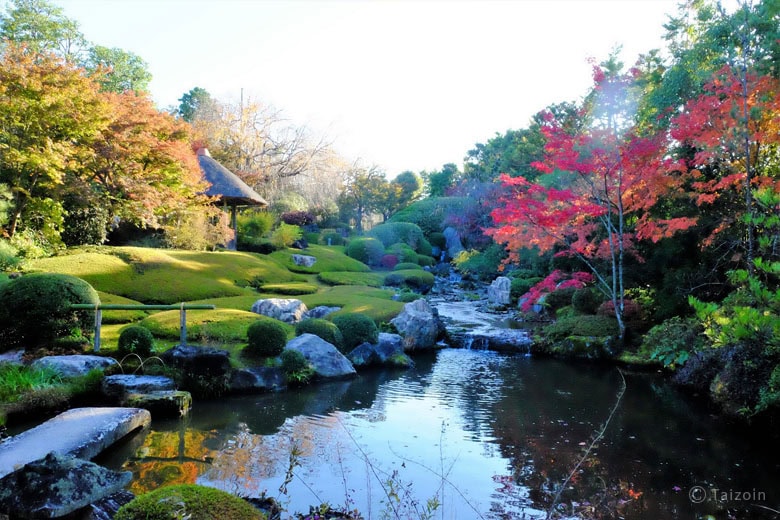
The famous ink wash “Catching a catfish with a gourd” becomes a gateway to understanding Zen philosophy under Matsuyama’s guidance. This 15th-century work, the oldest of its kind in Japan, includes the responses of thirty-one Zen masters to this impossible task, each offering their own interpretation of enlightenment through Chinese poetry.
LEARN MORE: Private Early Access Myoshin-ji Taizo-in Special Tour & Zazen Meditation (Matcha Included)
Finding Peace: Zen Meditation FAQ
1. What is Zen meditation?
Zen meditation, or Zazen, is a practice rooted in Buddhist teachings that emphasises mindfulness and presence in the current moment. It involves focusing on your breath and observing your thoughts and feelings without judgment. The goal is not to empty your mind but to cultivate awareness and inner peace.
2. What can I expect during a typical Zen meditation session?
A typical Zen meditation session involves sitting in a specific posture, focusing on your breath, and observing your thoughts and sensations without getting carried away by them. The duration can vary, but 30 minutes is a common length for beginners. You may receive guidance on posture and breathing techniques from an experienced practitioner.
3. Are these Zen meditation experiences suitable for beginners?
Yes, all the experiences mentioned are designed to be accessible to beginners. The instructors provide clear guidance and emphasise the importance of finding a comfortable position. You don’t need any prior experience with meditation to participate and benefit from these experiences.
4. What is sutra copying and why is it included in some Zen meditation experiences?
Sutra copying is the practice of transcribing Buddhist scriptures. It’s a contemplative exercise that promotes focus, mindfulness, and a deeper understanding of Buddhist teachings. The act of carefully writing each character can be meditative in itself, allowing participants to connect with the wisdom of the sutras.
5. What is the significance of the tea ceremony in Zen meditation?
The Japanese tea ceremony, or Chanoyu, is a ritualised practice deeply rooted in Zen philosophy. It emphasises mindfulness, presence, and appreciation for the simple act of preparing and sharing tea. The tea ceremony provides a moment of reflection and connection, complementing the meditative experience.
6. What is the benefit of incorporating the Shakuhachi flute into Zen meditation?
The Shakuhachi flute is a traditional Japanese bamboo flute known for its haunting and evocative sound. Its music is deeply intertwined with Zen practices, as its breath-driven melodies encourage mindful breathing and contemplation. The Shakuhachi’s sound can help deepen the meditative state and enhance the overall experience.
7. How can I choose the best Zen meditation experience for me?
The best experience for you depends on your individual preferences and interests. Consider factors like location, specific practices included (sutra copying, tea ceremony, Shakuhachi flute), and the overall atmosphere of each experience. Take my “Zen Meditation Experiences Quiz” and I’ll give you my personalised recommendation.
Your Zen meditation encounter awaits
These five experiences offer more than just a tourist’s glimpse into Zen meditation – they provide authentic pathways to discovering inner peace, guided by those who have dedicated their lives to this profound practice.
Whether you choose the historic halls of Kosei-ji Temple, the natural sanctuary of Tokoan, the urban oasis of Mishōan, the transformative gardens of Seiganji, or the private dawn at Taizo-in, each experience promises to leave you with not just memories, but tools for finding tranquility in your daily life.
Which will you choose?
Recommended for you

About the Author
A writer and publisher from England, Rob has been exploring Japan’s islands since 2000. He specialises in travelling off the beaten track, whether on remote atolls or in the hidden streets of major cities. He’s the founder of TheRealJapan.com.
Want a Japan trip that perfectly balances the iconic and the authentic? Concierge is my personalised travel planning service crafting journeys that align with your specific interests while incorporating both must-see highlights and hidden gems most tourists miss. Together, we’ll create an experience that goes beyond the surface, connecting you with the Japan you’ve always dreamed of discovering.
I’m Rob, and I’ve been where you are
I understand the struggle of building an itinerary that perfectly balances the iconic and authentic sides of Japan.
That’s why I founded The Real Japan, a place where independent travellers like you can thrive. My passion for sharing Japan beyond the cliches is what drives me.
I offer more that just inspiration; I provide personalised, unique and tailor-made travel plans to take your travels in Japan to the next level.
Want to see how I can transform your Japan travel?
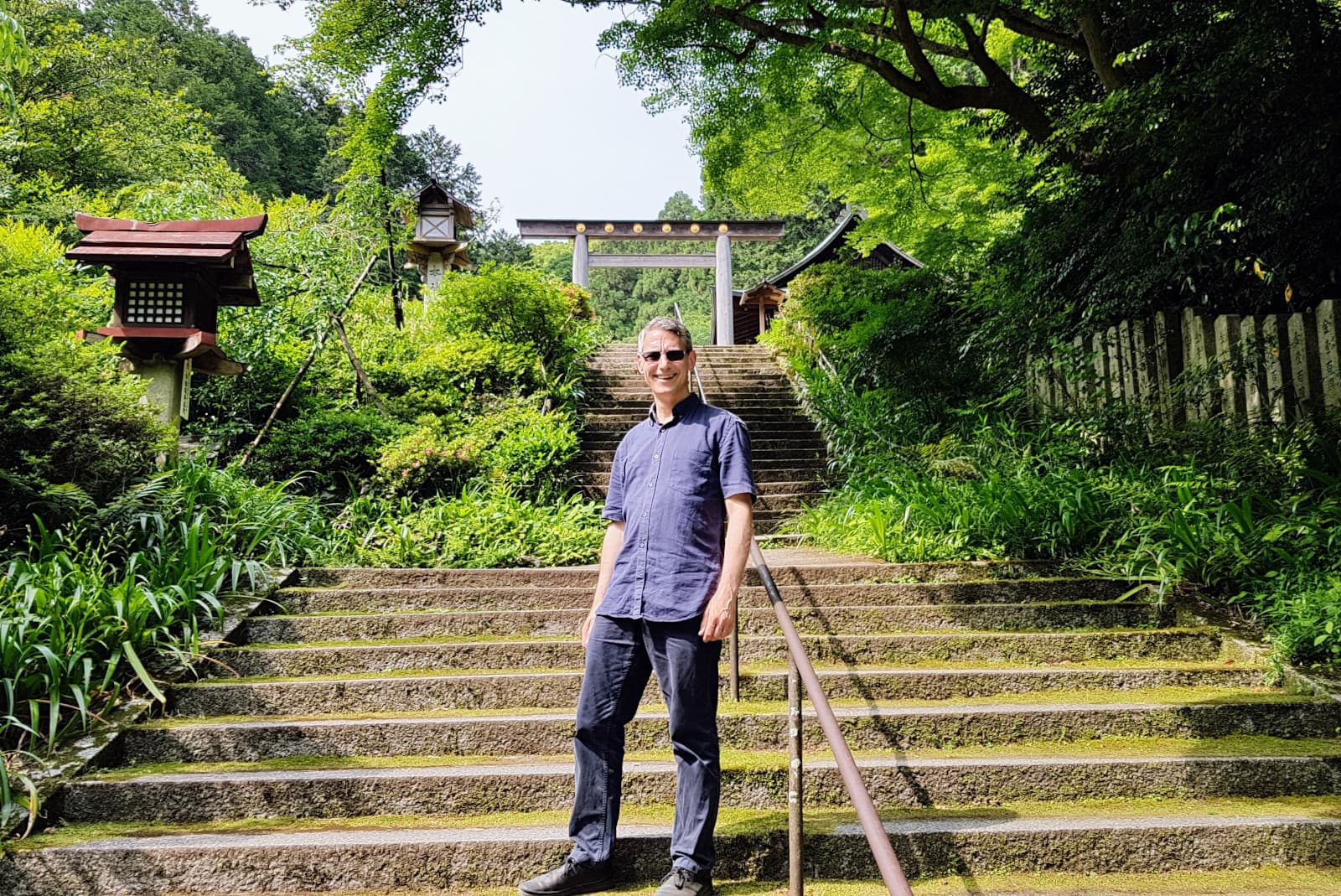
Benefits You Can Choose
Personal Itinerary
A tailor-made Japan Travel Plan matching your personal interests
and preferences
Unique Experiences
A unique Artisan Experiences Plan giving you private access to Japan’s finest craftspeople
Perfect Lodging
Curated accommodation/hotels recommendations based on your needs and criteria
What Clients Say
How It Works
Step 1: Book your service
Choose the plan duration that best fits your needs.
I have 4 options to choose from.
Step 2: I’ll handle all the details
I’ll ask you questions, we can jump on a Zoom call,
or you can email me your draft ideas.
Step 3: Your dream Japan
I set aside time to work exclusively on your travel plans.
I deliver your personal solution.
Ways I Can Help You With Concierge
Ready to Get Started?
RESOURCES
Take my Zen Meditation Experiences Quiz
Answer just a few quick questions and I’ll give you my recommendation for the best Zen meditation experience for you.
The Zen Meditation Experiences
1. KYOTO – Private Kyoto Temple Visit With Zazen, Sutra Copying, & Matcha
2. HAKONE – Zazen: Shakuhachi Flute & Tea Ceremony in Hakone
3. TOKYO – Zen Teachings: Guided Zazen & Sutra Meditation in Tokyo
4. SHIGA – Seigan-ji: Rock Garden Meditation & Coffee in Shiga
5. KYOTO – Dawn Zazen at Taizo-in: Private Tour & Tea in Kyoto
Wabunka – All Japanese Artisan Experiences
Further Related Reading
5 Exclusive Japanese Knife Experiences With Traditional Artisans
The Ainu – Japan’s Forgotten Indigenous People
Experience A Beautiful Japanese Tea Ceremony in Kyoto
Feel the Spirit of the Samurai Sword in Kyoto
Meeting an Itako – Spiritual Medium
Pulling Back The Curtain on Japanese Art and Culture
Stay In A Ryokan: The Best Way to Experience The Real Japan
More Great Experience Ideas
My List of Recommended Japan Travel Resources
Recommended Japan Travel Resources
Visit My Japan Travel Store
If you enjoyed this article please share this image online:



